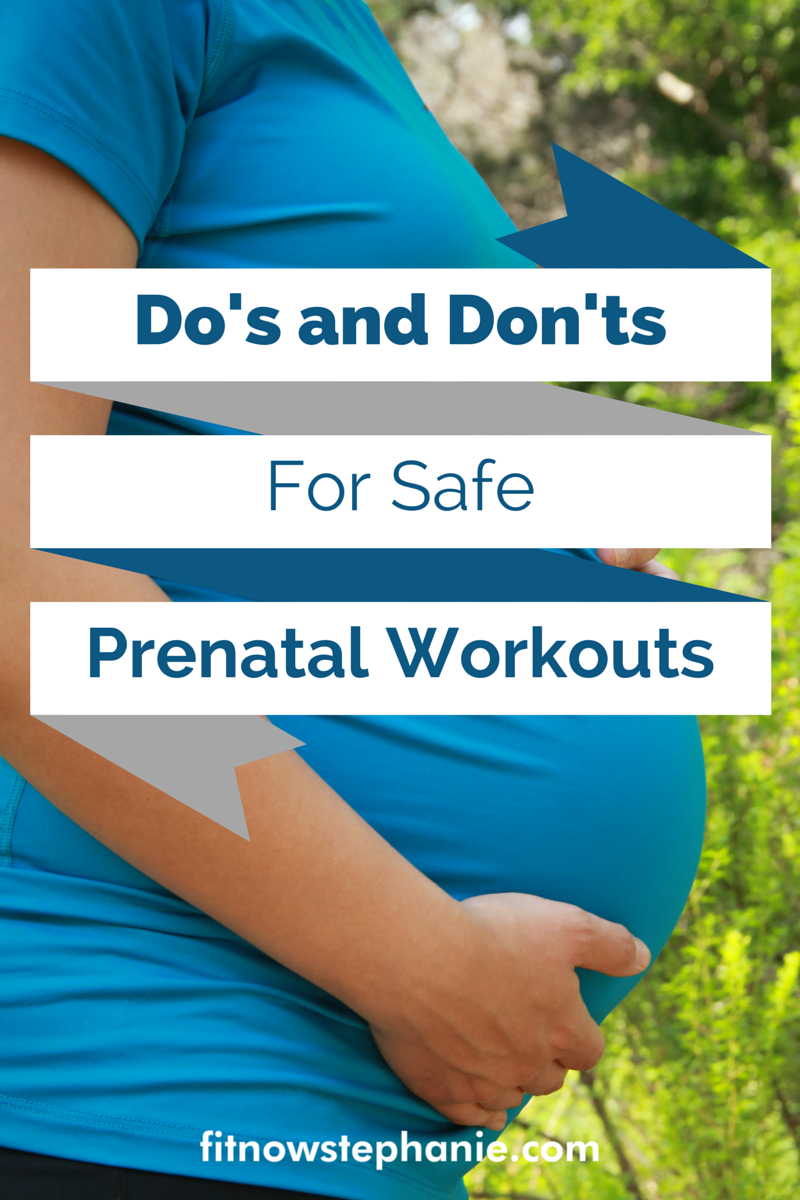Do’s and Don’ts for Safe Prenatal Workouts
I wanted to be as healthy as possible when pregnant, both for baby’s benefit and my own. Committing to a regular prenatal exercise plan (if cleared by your physician) is a significant key to staying healthy during your pregnancy. During my first pregnancy, I was teaching classes at a corporate wellness site, private gym, and campus rec program, and also doing my own workouts. I was definitely concerned about safety and not doing ANYTHING that might harm the baby.The recommendations are pretty general for healthy women who have been exercising regularly before becoming pregnant. You can continue your current routine, making adjustments as pregnancy progresses, while keeping the following safety guidelines in mind (based off the ACOG recommendations).If you have any medical conditions, contraindications, or concerns whatsoever, you must speak with your physician and follow their specific recommendations before starting a prenatal workout plan.I was able to exercise until the time I went into labor with all three of my pregnancies, and I know I felt better as a direct result. I believe it’s always better to play things safe and err on the side of caution – it’s just a few months, there will be plenty of time later to dive back into a serious workout routine!
During my first pregnancy, I was teaching classes at a corporate wellness site, private gym, and campus rec program, and also doing my own workouts. I was definitely concerned about safety and not doing ANYTHING that might harm the baby.The recommendations are pretty general for healthy women who have been exercising regularly before becoming pregnant. You can continue your current routine, making adjustments as pregnancy progresses, while keeping the following safety guidelines in mind (based off the ACOG recommendations).If you have any medical conditions, contraindications, or concerns whatsoever, you must speak with your physician and follow their specific recommendations before starting a prenatal workout plan.I was able to exercise until the time I went into labor with all three of my pregnancies, and I know I felt better as a direct result. I believe it’s always better to play things safe and err on the side of caution – it’s just a few months, there will be plenty of time later to dive back into a serious workout routine!
Prenatal Exercise DO’s
- Stay within a comfortable range of motion
- Keep intensity light to moderate – you should be able to breathe and talk easily at all times
- Drink water before, during, and after your workout (and throughout the day)
- Eat an extra 300 calories a day while pregnant
- Stay fueled before and after your workout to avoid hypoglycemia
- Wear comfortable, supportive clothing that fits appropriately
- Control body temperature by dressing appropriately and exercising in a comfortable climate (indoors if necessary)
- Take breaks if you feel out of breath or like you’re “overdoing it” - slow down but don’t stop completely as this could cause lightheadedness and fainting
Prenatal Exercise DON’Ts
Avoid the Following…
- Motionless standing, which could result in a decrease in cardiac output and blood pooling
- Sports or activities with a high risk of physical contact or abdominal contact/injury such as basketball, soccer, racquet sports, etc.
- Activities with an excessive challenge to balance or risk of falling
- Exertion at an altitude greater than 6,000 feet or scuba diving – risk of altitude sickness and decompression sickness
- Supine (lying on the back) after the first trimester, or approximately 20 weeks, which compresses the vena cava and reduces blood flow
- Exercise in hot or humid weather, or with fever
- Hypoglycemia, reduced blood glucose, adequate carbohydrate intake (30-50 g) food or sports drink
Relative and Absolute Contraindications to Exercise During Pregnancy
There are some conditions that are of special concern and would prevent you from exercising during pregnancy. If any of the following conditions apply, refrain from exercising and consult with your physician.These contraindications have been published by the American Congress of Gynecologists and Obstetricians (ACOG).
Relative Contraindications to Aerobic Exercise During Pregnancy
- Severe anemia
- Unevaluated maternal cardiac arrhythmia
- Chronic bronchitis
- Poorly controlled type 1 diabetes
- Extreme morbid obesity
- Extreme underweight (BMI <12)
- History of extremely sedentary lifestyle
- Intrauterine growth restriction in current pregnancy
- Poorly controlled hypertension
- Orthopedic limitations
- Poorly controlled seizure disorder
- Poorly controlled hyperthyroidism
- Heavy smoker
Absolute Contraindications to Aerobic Exercise During Pregnancy
- Hemodynamically significant heart disease
- Restrictive lung disease
- Incompetent cervix/cerclage
- Multiple gestation at risk for premature labor
- Persistent second- or third-trimester bleeding
- Placenta previa after 26 weeks of gestation
- Premature labor during the current pregnancy
- Ruptured membranes
- Preeclampsia/pregnancy-induced hypertension
Although most women can continue to safely exercise throughout pregnancy, stop and consult your physician if you have any doubts whatsoever. It's not worth taking a risk!If you have been cleared by a physician, and exercise has been recommended, continue to follow the safety Do's and Don'ts in your prenatal workout plan and stay fit and healthy throughout your pregnancy.
